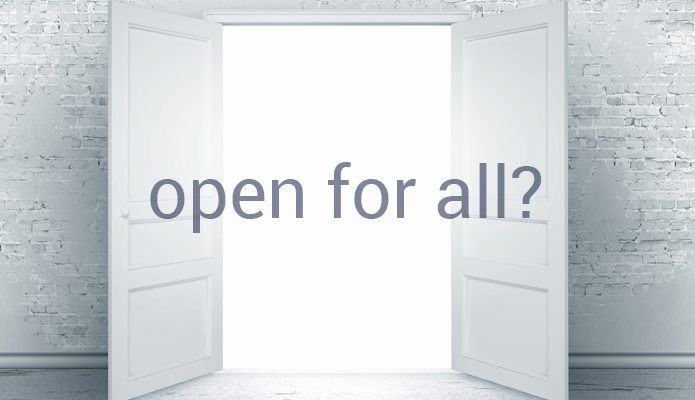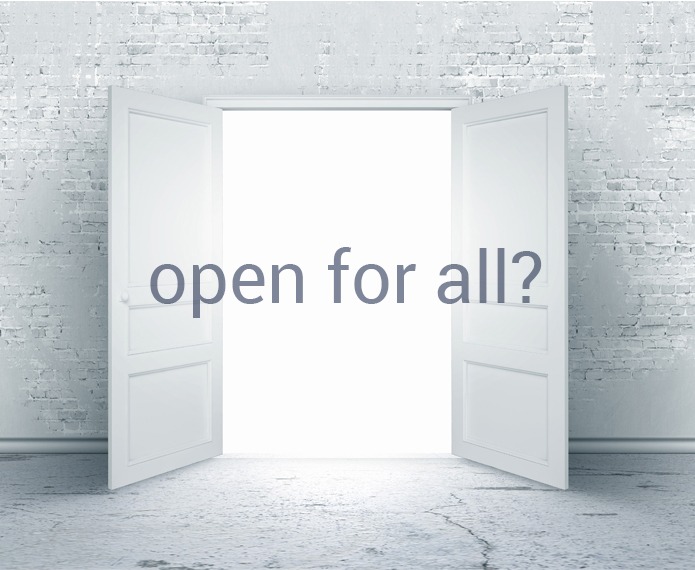The thinking of Comrade F. Dobler from the early 20th century remains relevant and even prescient: those who need open access to information may be those who are fundamentally excluded from public libraries.

The Right ‘Man’ For The Job?
I am a big fan of titles which have question marks in them. The most important element of Open to All? The Public Library and Social Exclusion (2000) was the question mark, because it challenged the widely held professional belief that public libraries are truly open to all. That there are no barriers to access and that we just have to open the Library doors and people will chose to come through them or not. Open to All? completely destroyed these myths and made barrier-free access to public libraries a question rather than a statement.
The Right ‘Man’ For The Job? the role of empathy in community librarianship (2008) also has a question mark in the title. It was generally agreed that Library Workers had all the skills they needed to do their jobs. They could catalogue and classify books, provide services, manage collections and develop programs. Their job was to run the library as effectively and efficiently as possible. What the community needed and wanted was not their concern. They knew best. They were the experts. They were certainly not Social Workers or Community Development Workers. That was somebody else’s job.
The Right ‘Man’ For The Job? tested these assumptions and asked the critical question – what skills do Library Workers require to meet community needs? And what is the role and importance of empathy, in particular, within this skill set? The researchers found that, not only did many Library Workers not have the right skill set to meet community needs, but they had no interest, understanding or awareness of issues such as social exclusion, diversity and other key dynamics within the communities they served. Their libraries were based in the community but not community-based or community-led. The researchers found that radical changes were required in staff training and development and made recommendations relating to Knowledge, Skills and Empathy.
Knowledge
The priority which they identified for public library managers within a staff training capacity was to address the apparent gap amongst staff in knowledge and understanding of social inclusion policy and political drivers. Staff at all levels working within services and projects that are responsive to such drivers should be fully informed of relevant external and political influences, and given the opportunity to question and discuss them further, and thus fully engage with the reasons for particular service developments and initiatives. In the current Canadian context these policy drivers would include the recommendations of the Truth and Reconciliation Commission and how these can be implemented by public libraries.
Similarly, greater effort should be made to provide relevant training and information on groups affected by social exclusion, in an attempt to significantly raise levels of awareness and cultural sensitivity amongst all staff. This would include training about homelessness, addiction issues, and those experiencing poverty, racism, homophobia and other forms of direct and indirect prejudice and discrimination.
On a very practical note, staff need the intellectual time and space to fully engage with and consider these issues, so the ‘away day’ method may be appropriate, particularly in reducing the risk of staff feeling additional pressure in having to absorb new information in their day-to-day work environment, and subsequently form a negative perception of inclusive approaches as ‘add-on’ responsibilities.
This needs to be carefully planned and scheduled into all new projects and service developments as an important part of the process, particularly in overcoming the ever-present ‘lack of time and money’ barrier.
Skills
The researchers defined the skills required to work in socially inclusive services as ‘advanced customer care’ skills, a term which I am not particularly comfortable with. I don’t think that public library patrons are customers, which implies a transactional relationship. I think that public library patrons are stakeholders, which suggests a partnership. But I full agree with the core skills that were identified for Library Workers:
- Communication skills
- Listening skills
- Influencing relationships
- Reflective practice
- Improved confidence and assertiveness
- Negotiation skills
- Dealing with conflict.
Empathy
The researchers concluded that it would be difficult to ‘teach empathy’, to train staff to develop an emotional response that is informed and influenced by personality, belief systems and other individual characteristics. However, the development of certain empathic skills can be encouraged by providing public library staff with the right knowledge and circumstantial information, involving them in decision-making processes, and facilitating the development of appropriate skills.
As a result of such interventions, staff can be enabled to show higher levels of empathy towards members of all communities, provided that they are willing – and have some natural capacity – to do so. This is a significant finding in supporting library staff at all levels to communicate with library users from all cultural backgrounds and, in the longer term, to deliver a more effective service.
As with Open to All?, I think that the recommendations of The Right ‘Man’ For The Job? have stood the test of time. As such, the future recruitment of the right person for the Library Worker position will be intrinsic to the effectiveness of public libraries’ contribution to the social inclusion agenda, and should be an absolute priority for the future of community led librarianship.
John Pateman is the CEO / Chief Librarian of the Thunder Bay Public Library. The Open for All? column explores the nature of libraries and their commitment to openness.
